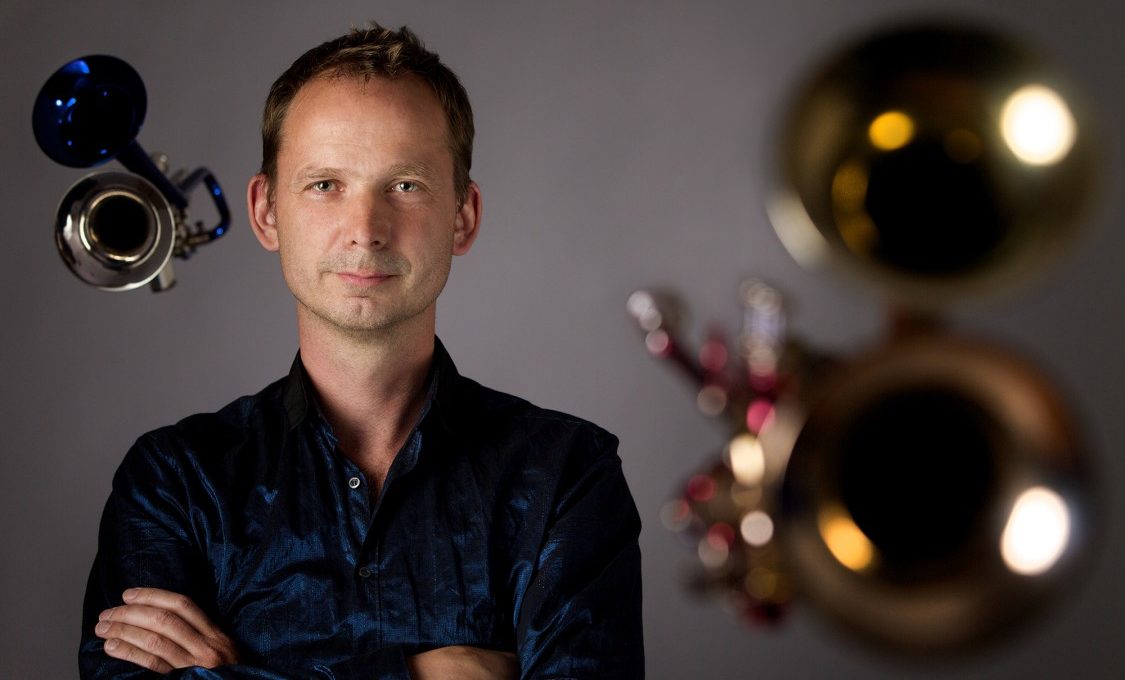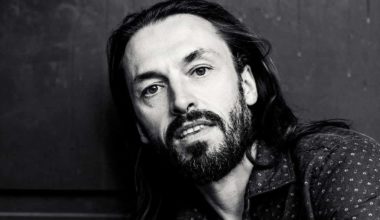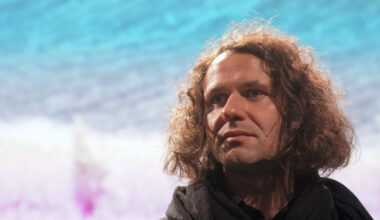Marco Blaauw has an international career as a soloist and is a member of Ensemble Musikfabrik in Cologne, Germany. An important focus of his work is to further develop the instrument and its playing technique and to initiate new repertoire. Blaauw works in close collaboration with both the established and younger composers of our time.
Blaauw will perform next week (3-12.3.2022) at Rebecca Saunders: Myriad II – an interactive concert installation by singuhr – projects at Radialsystem.
3 FACTS
1: Inhale
2: Exhale
3: Curious what will happen next
11 QUESTIONS
1. What is the biggest inspiration for your music?
The world we live in and all the sounds that surround me.
2. How and when did you get into making music?
In the small village where I grew up, I was offered trumpet lessons at age 11: A great gift.
It didn’t take too long to realize that this instrument would be my vehicle to move away from the village and start discovering the world.
3. What are 5 of your favorite albums of all time?
I don’t have favorite albums, but today these artists come to mind:
Alim Qasimov
Jimi Hendrix
Hossein Alizadeh
Bill Dixon
Miles Davis
4. What do you associate with Berlin?
Big city, big streets (too big for me), great language (reminds me of my own dialect), intriguing and important history lessons on so many corners of its streets, a big, international, adventurous music and art scene, important festivals
5. What’s your favorite place in your town?
The house and garden where I live.
6. If there was no music in the world, what would you do instead?
Invent and teach music, play the trumpet even louder.
7. What was the last record/music you bought?
“Being and Becoming” by Peter Evans.
8. Who would you most like to collaborate with?
With all composers, musicians, choreographers, visual artists, filmmakers, authors, philosophers, historians, archeologists, curators – and all other people I am forgetting here – who can help and inspire me to understand the world a little bit better….
9. What was your best gig (as performer or spectator)?
As a performer, I don’t think there is such a thing as a best performance. Every performance seems a unique and essential experience.
As a spectator, I do remember one transforming experience:
I was a young music student at a conservatory located in the remains of an old monastery. There was only one friar left. He had a little garden to himself in the courtyard where he held chickens and one very active and loud rooster. These animals were talked about a lot, usually in a very unfriendly way. Teachers and fellow students seemed to think they were too loud. There was even a group of very dedicated musicians who started a movement to ban the friar and his animals from the courtyard so that they would finally be able to work undisturbed on their music studies.
During lunch breaks, some teachers of the theory and composition faculty organized contemporary music concerts. I was one of the very few regular and thankful visitors to that series. There was no new music offered in any other curriculum. For some reason, though, on one occasion, a bigger audience showed up. The rector came with some other faculty members known for disliking the composition department’s performance experiments. This lunch concert suddenly felt very important and unique.
On the program were works by Charles Ives and John Cage, including a performance of 4’33. I don’t think that anybody besides the organizers knew what this piece was about. Like all other concerts, this program was moderated. It was assumed that all the new works would be easier to listen to with some explanation and historical context. 4’33 Was announced as a piece that changed music history, and it required the audience’s highest concentration and silence.
When the pianist started the stopwatch, I was blown away by the effect that composed silence had on me and the rest of the inexperienced listeners. It was fascinating to observe the reactions around me. Already after about 30 seconds, there was a noticeable growing tension in the air: disbelief, discomfort, suppressed frustration, and laughter seemed to build up to an unavoidable explosion. Audience members started looking around, looking for support from their fellow audience members. Silence can hurt – and this was such an occasion. How long would we be able to persevere in remaining silent?
Just before people started to collapse, the rooster in the courtyard, not far from the listening pianist, started its liberating song. Loud and clear, as if he knew that he had a unique opportunity to convince an attentive audience to change the generally negative opinion on his existence. As an ambassador for his fellow chickens and the old friar, he kept crowing full blast for the remaining 3 or so minutes. The audience, still respecting John Cage’s silent prayer and the request for quiet and concentration, was moved to tears.
After the pianist stopped the stopwatch at 4’33, the rooster had a new group of appreciative friends, and the friar was allowed to stay and keep his animals in the courtyard.
10. How important is technology to your creative process?
It seems to get more and more critical. There are way too many days where I spend more time with electric tools than with my trumpet.
The endless possibilities seem magnetic; they pull me into a world that promises infinite space and freedom. But can technology fulfill this promise?
I try to make sure that I keep breathing and play the trumpet. My unreliable, unpredictable, fascinating, analog sound source keeps reminding me to become what I am, just a humble human being.
11. Do you have siblings, and how do they feel about your career/art?
I have two older sisters, one older brother.
We never talk about my work. I am the only musician in the family and the only freelancer. I assume they think my work is quite exotic and weird. They might even feel sorry for me that I have to travel so much and hardly have any holidays or free weekends…
My brother came to one of my performances of La Monte Young’s “The Second Dream of the High Tension Line Stepdown Transformer” – he was very surprised and loved it!
Marco Blaauw has an international career as a soloist and is a member of Ensemble Musikfabrik in Cologne, Germany. An important focus of his work is to further develop the instrument and its playing technique and to initiate new repertoire. Blaauw works in close collaboration with both the established and younger composers of our time.
Many composers have written works especially for Blaauw, such as Peter Eötvös, rebecca Saunders, Georg Friedrich Haas, Wolfgang Rihm, and John Zorn. Blaauw also worked intensely with Karlheinz Stockhausen for 17 years. In 2015 he established the trumpet ensemble Monochrome Project. In direct communication with La Monte Young, he produced the eight trumpet version of The Second Dream of the High Tension Line Stepdown Transformer, bringing La Monte Young’s groundbreaking work to audiences throughout Europe. Monochrome Project premiered an evening-long work by Anthony Braxton during the 2018 Ruhrtriennale.
Marco Blaauw initiated Global Breath in 2016, a worldwide research project on the trumpet, beginning with a series of interviews with international trumpet pioneers. The first stage of this research will culminate in the Global Trumpets Festival in 2021. Blaauw’s work is widely documented through radio, television and CD recordings. Blaauw is also intensely active as a teacher, f.e. in international master classes, leading the Brass Academy at the International Darmstadt Summer Courses, as a guest teacher at Lucerne Festival Academy and the Royal Conservatory in The Hague.
With more than 500 interviews online, 11+3 Questions by D/B is dedicated to personal interviews, and designed to give you an insight into the motivations and aspirations of the best creative minds in the world.


